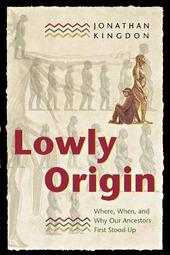
|
Lowly Origin: Where, When, and Why Our Ancestors First Stood Up
Paperback / softback
Main Details
| Title |
Lowly Origin: Where, When, and Why Our Ancestors First Stood Up
|
| Authors and Contributors |
By (author) Jonathan Kingdon
|
| Physical Properties |
| Format:Paperback / softback | | Pages:416 | | Dimensions(mm): Height 235,Width 152 |
|
| ISBN/Barcode |
9780691120287
|
| Classifications | Dewey:599.938 |
|---|
| Audience | | Professional & Vocational | | Tertiary Education (US: College) | |
|---|
| Illustrations |
22 Maps
|
|
Publishing Details |
| Publisher |
Princeton University Press
|
| Imprint |
Princeton University Press
|
| Publication Date |
4 October 2004 |
| Publication Country |
United States
|
Description
Titled after the last two words of Darwin's Descent of Man and written by a leading scholar of human evolution, Lowly Origin is the first book to explain the sources and consequences of bipedalism to a broad audience. Along the way, it accounts for recent fossil discoveries that show us a still incomplete but much bushier family tree than most of us learned about in school.
Author Biography
Jonathan Kingdon is a Senior Research Associate at the Institute of Biological Anthropology and Department of Zoology of Oxford University. He is the author of and artist for numerous books, including "Self-Made Man" and "Island Africa" (Princeton). The Millennium issue of "American Scientist" named Kingdon's "Atlas of Evolution in Africa" one of the "100 books that shaped a century of science."
Reviews"[A] remarkable new book... [I]n Kingdon we find a primate who is unafraid to give the establishment a good hard shake, and whose keen powers of observation and reasoning make him impossible to summarily dismiss... Indeed so packed with novel ideas is Lowly Origin that it presents us with a picture of human evolution quite unlike anything that has come before it."--Tim Flannery, New York Review of Books "Lowly Origin is brimming with information, insight, experience and speculation about how we became human... [A] comprehensive and evocative rendition of who we are and how we fit in to the natural world."--Donald Johanson, Los Angeles Times Book Review "Elegant and thoughtful... Jonathan Kingdon commands a unique position at the interface of science and art ... Whether or not [he] manages to convince you of his larger thesis, you will be provoked along the way by the many connections he makes. And just as important, Lowly Origin is a landmark for its thoroughness in integrating the story of human evolution (which he brings up to the present day) with that of the evolving landscapes and habitats of the African continent."--Ian Tattersall, Natural History "Lowly Origin ... provides much new food for thought for lay readers and specialists alike."--Osbjorn M. Pearson, Journal of Anthropological Research "Naturalist-artist Kingdon is well known for his books on African mammals and his beautiful illustrations of them... [This] book is well written and charmingly illustrated."--Choice "Every so often ... a new concept comes into being. In Lowly Origin, Jonathan Kingdon puts forward just such a new concept... Lowly Origin is full of insights and displays the profound knowledge of African geography and ecology that is the hallmark of all Kingdon's work."--Peter Andrews, Times Literary Supplement "Jonathan Kingdon is a subtle amalgam of artist and scientist. He has a deep and up-to-date knowledge of human prehistory, and of the topology and geography of Africa, the continent where most of human prehistory happened. But he is also our leading zoological artist, and I think it must be his artist's eye that gives his writing style its vividness... Kingdon is a wonderful example of a "Third Culture" writer: a scientist who communicated his original ideas to fellow scholars in books that can be read--and enjoyed--by any educated person."--Richard Dawkins, Times Literary Supplement "Lowly Origin is an evocative book that highlights one of the key factors that makes us human--our bipedality... Kingdon's writing is lucid and his illustrations are beautiful in showcasing just how this important component of human evolution took place... A must read. A must have."--Ann Haley MacKenzie, American Biology Teacher "Jonathan Kingdon is ... singularly well equipped to cast an eye over the thorny problem of human origins... Kingdon has read widely and wisely... [He] does not claim to have found the answer to human origins. The real message of the book is the rich contextual evidence it provides. Wise students of human evolutionary history would be well advised to think carefully about that message."--Bernard Wood, Bioscience "There are people who will authoritatively disagree ... however, any subsequent account will have to parry Kingdon's version with equally explicit consideration of ... equally vivid pictures of ways of life."--Alison Jolly, London Review of Books
|